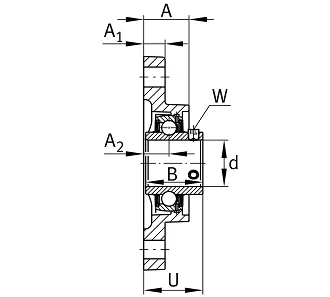Sep . 01, 2024 12:12 Back to list
Agricultural Equipment Bearings - Durable & Reliable Solutions
Importance of Bearings in Agricultural Equipment
Agricultural equipment plays a crucial role in ensuring efficient and effective farming practices. From tractors to harvesters, these machines are essential for the successful production of crops and livestock. One critical component that often goes unnoticed but is vital for the smooth operation of agricultural machinery is the bearing.
Bearings are mechanical elements that reduce friction between moving parts, allowing for smooth rotation and operation. In agricultural equipment, they are used in various applications, from drive shafts and wheels to engines and rotary components. The reliability and performance of these bearings have a direct impact on the machinery's overall efficiency, durability, and maintenance requirements.
One notable characteristic of bearings used in agricultural applications is their ability to withstand harsh conditions. Farms are often environments with high levels of dust, moisture, and extreme temperatures. Therefore, selecting the right type of bearing is essential. Manufacturers typically offer sealed or shielded bearings designed to protect the internal components from contaminants. These specially designed bearings help extend the life of the equipment and reduce the frequency of repairs, ultimately saving farmers time and money.
agricultural equipment bearings

Another critical aspect of bearings in agricultural equipment is the load-bearing capacity. Agricultural machines are subjected to significant forces and loads during their operation, whether it’s a tractor plowing a field or a combine harvester collecting crops. Bearings must be precisely engineered to handle these stresses without failure. Higher quality bearings can provide better performance under load, enhancing the machine's overall reliability.
In recent years, advancements in technology have led to the development of specialized bearings tailored to the requirements of modern agricultural practices. Innovations such as ceramic and composite materials have led to bearings that offer improved resistance to wear, corrosion, and temperature fluctuations. These improvements translate into longer service life and lower replacement costs for farmers, making modern agricultural machinery even more efficient.
Regular maintenance of bearings is also key to ensuring the longevity of agricultural equipment. Farmers must be vigilant about inspecting bearings for signs of wear or damage. Timely replacement of worn bearings can prevent costly breakdowns and improve the overall productivity of farming operations.
In conclusion, bearings are a critical component of agricultural equipment that significantly impacts its performance and longevity. Their ability to reduce friction, withstand harsh conditions, and support heavy loads makes them indispensable in modern farming machinery. By understanding the importance of bearings and investing in quality components, farmers can ensure their equipment operates efficiently, ultimately supporting sustainable agricultural practices.
Latest news
-
25MM 2 BOLT UCFLX05-14 Flange bearing unit( oval)
NewsMar.07,2025
-
4 bolt UCF 200 series Pillow block bearings
NewsMar.07,2025
-
25MM 2 BOLT UCFLX05-14 Flange bearing unit( oval)
NewsMar.07,2025
-
UCF216-50 4-Bolt Flange Housing Square Bearing
NewsMar.07,2025
-
25MM 2 BOLT UCFLX05-14 Flange bearing unit( oval)
NewsMar.07,2025
-
spherical roller bearing material exporter
NewsMar.07,2025





